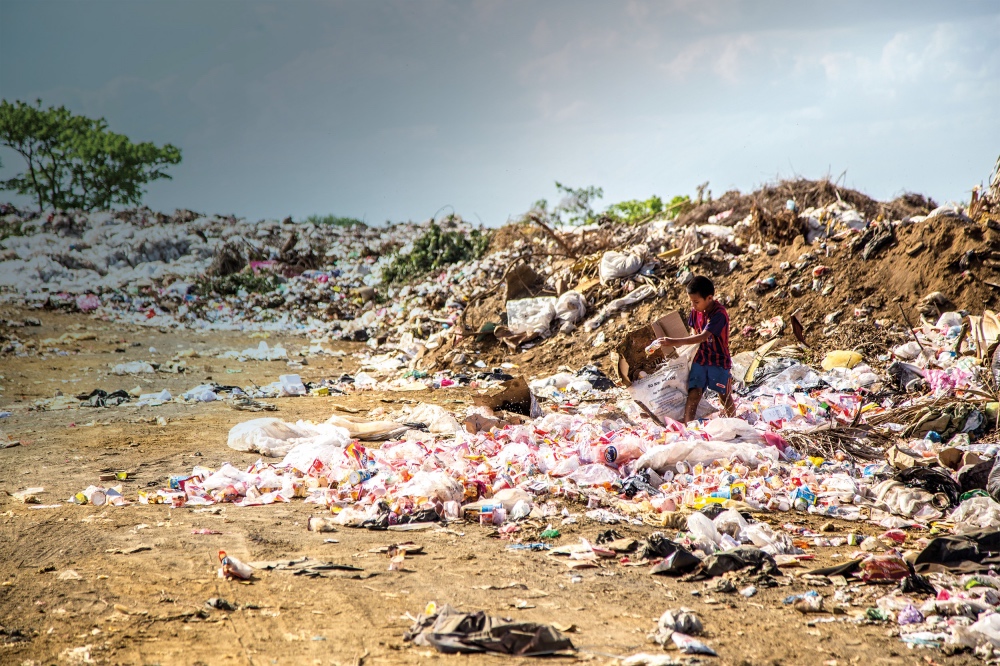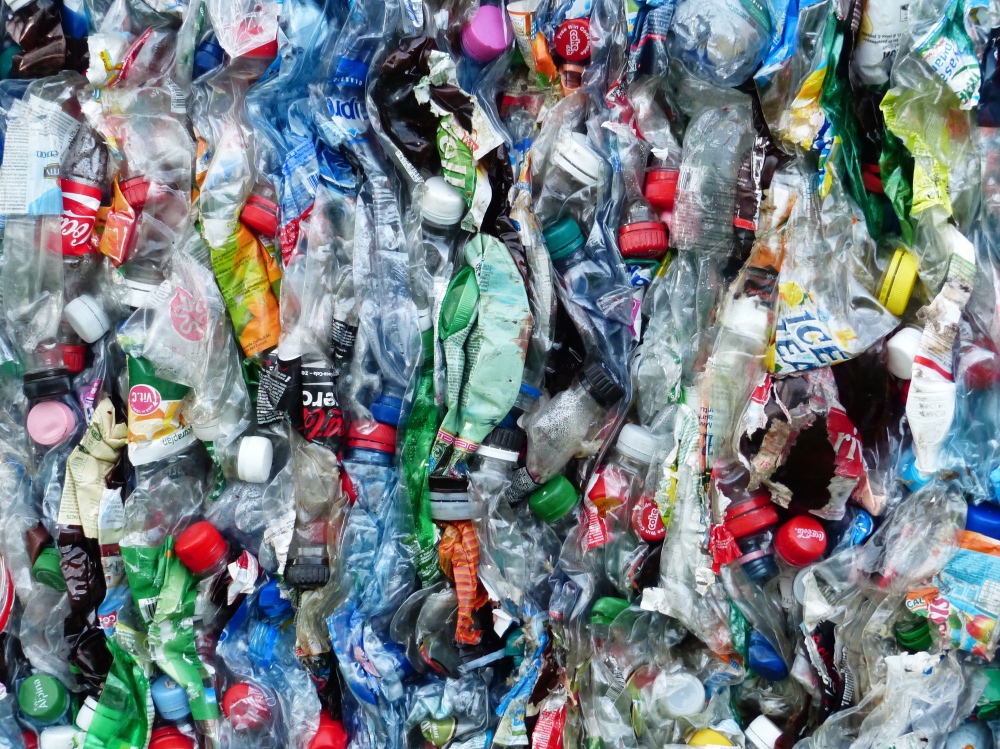
DAVID ADAMS reports on a new Australian campaign aimed at engaging churches in the fight against plastic waste…
Up to a million people are dying every year from diseases caused by mismanaged waste, a figure which roughly equates to a person dying every 30 seconds.
That shocking statistic is at the heart of a new TEAR Australia initiative called The Rubbish Campaign which aims to raise awareness and encourage greater action in tackling the world’s growing garbage problem and its impacts.

Less than 10 per cent of plastic has been recycled according to the No Time To Waste report. PICTURE: Courtesy of TEAR Australia
Jo Knight, head of advocacy at the Christian aid and development organisation, says the campaign – which is part of a wider global effort to address the issue of garbage under the banner of ‘Renew Our World’ – is essentially about tackling the connection between plastic pollution and poverty.
“[It’s] highlighting that the world’s rubbish problem, particularly plastic…is hitting people in poverty the hardest,” she says.
“[It’s] highlighting that the world’s rubbish problem, particularly plastic…is hitting people in poverty the hardest.”
– Jo Knight, head of advocacy at TEAR Australia.
The report which underpins the campaign – No Time To Waste – draws attention to the rising amount of single-use plastics multinational companies are putting into developing nation markets and highlights the lack of attention being given to sustainably managing the waste they generate.
It shows that two billion people now lack access to properly regulated solid waste collection while a further billion don’t have controlled waste disposal meaning that in the poorest countries, an estimated 93 per cent of waste is burned or discarded on roads, open land, or waterways.
The report, which was co-authored by Tearfund UK, Flora & Fauna International, WasteAid and The Institute of Development Studies and has the endorsement of naturalist Sir David Attenborough, shows that as well as impacting the environment, diseases relating to mismanaged waste are estimated to cause between 400,000 and a million deaths each year in developing nations.
Drawing on new Tearfund research, the report says mismanaged waste does this in a number of ways including by creating a breeding ground for disease-carrying flies, mosquitos and vermin which can spread diseases like malaria, dengue and typhoid fevers, tuberculosis, rabies and plague. Those living in areas affected by mismanaged waste experience double the incidence of diarrhoeal disease, the second leading cause of death for children aged under five around the world.
In places where waste is openly burnt, there is increased risk of diseases such as heart disease, cancer and respiratory ailments while discarded waste can also cause flooding, resulting in water-borne diseases, and pollute water supplies and soil.
Knight believes that, given the data showing the impact of rubbish on people’s health in poorer nations, it was time to “reframe” thinking around the amount of plastic being produced – what she calls “upstream” considerations – and what happens to it after it’s discarded – “downstream” considerations – as well as where responsibility for where the plastic ends up lies.
“And it might be different to perhaps our assumptions in the past where we may not have understood how devastating plastic can be on our environment, our food systems, and now also on the poorest of the poor and people’s health.”

Discarded plastic. PICTURE: Courtesy of TEAR Australia
Knight says the long-lasting consequences of plastic pollution means multi-nationals “need to build into their business model…things around what it is they’re producing and what volumes but also how they can be part of waste management and restoration.”
“The campaign is calling out four of the biggest multi-nationals [Coca-Cola, Nestlé, PepsiCo and Unilever] that are producing those single-use plastics to step up to take responsibility for both what’s going into those markets but also how it’s being dealt with once they are in country,” explains Knight.
“We need to see systems to deal with things rather than people dying from disease that is being caused by clogged waterways and the diseases that are spreading from mismanaged waste.”
To that end, the report and campaign – via a petition open for the public to sign – is asking multi-national companies to make four key commitments with regard to plastic use.
These include reporting how much single-use plastic is being sold country-by-country and then committing to halving that amount by 2025 as well as committing to ensuring that a single-use plastic item is collected for recycling for every one sold by 2022 and working with waste-pickers and others to provide “employment with dignity”.
It is intended that the petitions will be presented to the four companies before their annual general meetings early next year.
Knight says that while in Australia there has been considerable public discussion of how the country can cope with the current recycling crisis – sparked when countries it was being shipped to said they would no longer accept it, there was still not an assumption that multi-national companies “might need to have less packaging or be part of the solution”.
“They’re the sort of conversations we need to globally start having, around what we expect of corporations and the role of the consumer, the government, the corporations [and] together how we tackle these complex crises,” she says. “Because if each part of that puzzle steps up in its responsibility, I think we can start to tackle these big problems.”
A PLASTIC TSUNAMI
• An estimated 8.3 billion tonnes of plastic has been produced since the 1950s.
• About half of all plastic has been produced in the past 15 years alone
• About 80 per cent of all plastic produced has ended up in landfill, the ocean, being burnt or left loose in the environment.
• Less than 10 per cent of plastic produced globally has been recycled.
Source: No Time To Waste
TEAR Australia are hoping churches – as well as individual Christians – will support the campaign which Knight says is just the latest step in the organisation’s ongoing efforts to lead conversations around faith, consumerism, justice and “understanding what does it mean to love our global neighbour but also [to] care for God’s creation.”
“God calls us to pursue an abundant life, not an abundance of things,” she says, noting that every five minutes Australians are covering a soccer pitch-sized area with plastic waste.
“I think part of it is the level of how much is produced and, as consumers, we play a role in that, and, as Christians, we can say that ‘In response to my global neighbour, in response to God’s creation, I don’t need to consume so much’. We have a lot of stories of supporters to share around how people are living more simply and how people are tackling challenges [such as] being a plastic-less church or how, as a church, [they’re] doing waste-picking walks or other ways to engage their faith with how to change lifestyles.”
A range of resources is being made available to churches and other Christian organisations to help them engage with the campaign. They include a video of poet Joel McKerrow reading a new spoken word poem entitled Waste.
Knight says it’s hoped that the church can be a “light” and a “pointer” toward a way of living that honours both our neighbours and God’s creation.
“Absolutely we want churches to be leading these conversations in their community, getting alongside efforts that are happening…”
She says that while it’s not yet too late to start changing our ways and protecting the environment and the world’s poor, people have to start gaining a better understanding of the damage plastic is doing.
“We now have that understanding that we must act and turn things urgently around. But if we were to continue on that trajectory over the next 10 to 15 years – where we’re looking at plastic production more than doubling and that mainly being in the countries least able to deal with it – then absolutely we have a crisis on our hands.”





